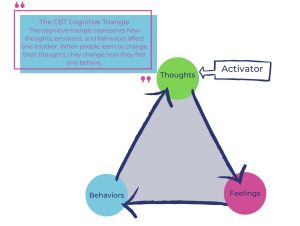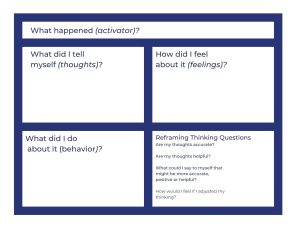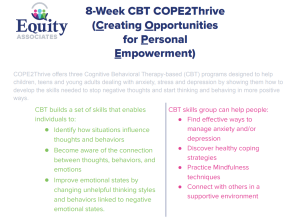When Student Aggression & Teacher Burnout Collide
…Respond with Cognitive-Behavioral Therapy (CBT) Intervention
February may well be one of the most brutal months of the school year. Student behaviors tend to rise with few school breaks between January and March, long winter days, and less outside time. Simultaneously, educators’ stamina wanes, often leaving schools overtaxed with competing demands, understaffed, and stressed to the max.
As we round out Equity Associates’ “What is it about February?” series, we look at how schools can respond with Cognitive-Behavioral Therapy (CBT) Intervention when student aggression and teacher burnout collide.
Student aggression can be a manifestation of an underlying mental health disorder.
Over the course of life post-pandemic, schools have reported an increase in student aggression by almost fifty percent. Simultaneously, experts agree youth are experiencing a mental health crisis as reports of adolescent anxiety and depression increase alarmingly. Student aggression can often be a manifestation of an underlying mental health disorder. Statistics from The Centers for Disease Control and Prevention report 1 in 3 children struggling with anxiety also have a behavior problem. Furthermore, the majority of young people struggling with depression had co-occurring anxiety. Within the group suffering from depression and anxiety, 1 in 2 had a behavior problem. Yet, soberingly, CDC also reports that only 6 in 10 students struggling with anxiety and 5 in 10 students with a behavior disorder received any treatment. Schools are the essential place to provide targeted mental health services to support improved symptoms of anxiety and depression, such as aggression. Students are most likely to seek and participate in counseling support and intervention offered within their school setting.
How can schools respond to students’ aggressive behavior and compounded mental health challenges most effectively?
All across the country, school personnel are working harder than ever, yet students’ mental health needs continue to compound challenges facing schools. As a result, schools must respond strategically to the youth mental health crisis. Yet the balance is a delicate one. Staff are often emotionally exhausted, stressed, depressed, and anxious themselves. This circumstance stems from managing students’ aggressive behavior and the immediate demands of students’ unmet mental health needs.
For this reason, schools must ensure they focus on the right work at the right time regarding school-based mental health intervention. In the school-based mental health landscape, this means utilizing evidence-based interventions. Evidence-based mental health interventions are results-oriented as they have been proven effective through outcome evaluation studies. Therefore when implemented with integrity, they yield effective changes to the targeted behavior.
Cognitive-Behavioral Therapy (CBT) is an evidence-based intervention for student aggression.
Cognitive-Behavioral Therapy (CBT) is an evidence-based intervention that can help manage depression and anxiety and alleviate aggressive behavior by assisting students in learning to change the way they think and behave. This modality is scientifically proven to be effective at treating anxiety and depression. CBT allows students to learn to evaluate their thinking and have greater control over their behavior and emotions by focusing on the relationship between their thoughts, feelings, and behaviors.
Cognitive-Behavioral Therapy is an interactive, skill-based, structured, brief evidence-based mental health intervention. CBT focuses on what is happening now and learning new skills to cope with the present rather than exploring and evaluating earlier experiences. The philosophy behind CBT is that learned patterns of negative thoughts, and unhelpful behaviors can lead to psychological challenges such as anxiety, depression, and aggressive behavior. When negative thinking is identified and replaced, negative behaviors no longer serve a need because new positive ways of thinking lead to positive changes in feeling and then positive changes in behavior.

A core tenet of CBT is The Cognitive Triangle which demonstrates the interaction between thoughts, feelings, and behavior. For example, when negative thoughts develop based on an activating event, this can lead to difficult emotions and destructive behavior such as aggression. But learning to identify negative thinking and reframe it to more positive thinking leads to positive emotions and behaviors. So the goal of CBT is to change the thought process to determine the unhealthy thoughts that lead to difficult feelings and to learn to replace those thoughts with more productive ones.
The Community Preventive Services Task Force recommends school-based cognitive behavioral therapy programs as an evidence-based intervention among school-aged children and adolescents to prevent or reduce symptoms of anxiety and depression, such as aggressive behavior. Various school personnel can implement CBT approaches since the intervention is very prescribed. Following a structured protocol, trained staff, including administrators, counselors, social workers, teachers, nurses, aides, etc., can use the approaches outlined in the protocol to help students. As a result, students will learn to develop strategies for improved problem-solving, increase their ability to take control of their emotions without acting impulsively, and establish productive patterns of thinking, feeling, and behaving. When schools implement evidence-based mental health interventions such as CBT, they can ensure students’ symptoms of depression and anxiety will lessen. In turn, CBT strategically targets the reduction of aggressive behaviors.

You can start drawing on the philosophies of CBT by using these questions as a guide to help you walk students through evaluating the thinking that led to their aggressive behavior.
Teachers are impacted by students’ struggles with anxiety and depression.
Students’ struggles with anxiety and depression impact teachers as they manifest in various ways, including aggression. Unfortunately, teachers are often the target of students’ aggression. In fact, the 2022 State of Teaching Statistics survey reveals 6 in 10 teachers indicate experiencing physical violence or verbal aggression from a student over the last two years, and eighty percent of teachers report the necessity to spend more time on students’ mental health. Simultaneously teachers cite negative student behavior and high workload as the most substantial causes for their exhaustion and increased burnout. Therefore it is unsurprising that almost half of the teachers surveyed planned to quit the profession or transfer to a different position within the next three years.
Teachers need support and coping strategies for how to handle occupational stress.
If nothing is done to address educators’ struggles with burnout, schools might likely be dealing with both an adolescent mental health crisis and a teacher mental health crisis, as burnout can lead to clinical depression, anxiety disorders, and other mental health impairments for teachers. While many well-intending school leaders prescribe “self-care” as the answer, a much more multifaceted approach is necessary as teachers need support in developing coping strategies to handle their occupational stress. CBT is gaining traction as a promising intervention for supporting teachers in stressful conditions and reducing burnout. CBT has been found to minimize stress levels associated with emotional exhaustion in teachers and maintain positive treatment effects long after the short-term intervention.
Unfortunately, teachers frequently feel siloed and alone in their struggles. Societal factors can cause teachers to feel blamed for more than would reasonably be within their sphere of influence, including students’ mental health conditions. CBT aims to normalize teachers’ feelings by accepting and validating their feelings. The goal of CBT is not to change feelings but rather to identify the thoughts associated with the feelings and target changing the thoughts. CBT is an interactive, goal-oriented, outcome-driven, structured intervention that can help teachers reformulate their thinking and improve their stamina by regulating their stress levels under difficult occupational circumstances.
By drawing on CBT Socratic Questions as a guide, you can start using CBT philosophies as you help teachers process difficult circumstances involving students’ aggression.
- What thoughts are you having about students’ behavior?
- How do your thoughts about students’ behavior make you feel?
- Are you basing your thoughts on facts or feelings?
- What is the evidence for your thought? Against it?
- Is this thought black and white when really it is more complicated?
- Is this thought helpful?
- Might other people have different interpretations of this same situation? What are they?
- Are you having this thought out of habit, or do the facts support it?
- Did someone pass this thought/belief to you? If so, is it a reliable source?
- Is this thought a likely scenario, or is it the worst-case scenario?
- What could you say to yourself that might be more productive right now?
When student aggression AND teacher burnout collide, schools can implement evidence-based interventions, such as CBT, to respond.
CBT can treat BOTH students suffering from anxiety & depression AND teacher burnout. CBT lessens students’ symptoms of anxiety & depression and therefore reduces student aggression. In addition, CBT intervention can help school staff process and reframe their thinking to promote stress relief & greater feelings of centeredness and job satisfaction.
Innovative solutions with community partners are necessary now more than ever to offer schools evidence-based intervention support. Equity Associates is a telemental health organization explicitly designed to respond to the dynamic needs of schools. Founded by educators for educators, we are here to help shoulder the increased demand for mental health support in your school setting for both students and teachers.
 Equity Associates CBT Cope2Thrive Small Group brief intervention for students can help with aggressive behavior.
Equity Associates CBT Cope2Thrive Small Group brief intervention for students can help with aggressive behavior.
Equity Associates offers an eight-week online CBT Cope2Thrive small group intervention program, billable to your students’ insurance or paid for by mental health funding we help your school source. Our CBT Cope2Thrive groups are delivered as an integrated part of your school day. The CBT Cope2Thrive group is data-driven and is progress monitored to ensure symptoms of anxiety and depression improve so aggressive behavior decreases. Enrolling students in the group is quick and easy, and groups can be started at any point in the school year.
Equity Associates CBT Tier 3 individualized intervention can decrease student aggression.
Equity Associates will match your students with targeted mental health interventions, such as CBT, from our network of specialized and highly qualified providers. We will connect your students with consistent and individualized support that is billable to their insurance or paid for by mental health funding we help your school source. Our intake process is adolescent-friendly. Students can get started just by texting us, and we can get students connected with services in as little as three days. Since CBT is a short-term intervention, your students will learn new skills to manage their aggression within a few weeks of beginning.
Equity Associates CBT Support Group for teachers can improve morale.
Equity Associates will customize a brief CBT support group for your teachers, which can be held before or after school online, allowing teachers to log in to participate from home. This structured group approach validates and externalizes feelings of burnout while helping teachers learn to reframe their thinking, challenge negative thoughts and beliefs, and learn new coping strategies for managing their occupational stress. In addition, teachers benefit from immediate feedback within the group while working on specific thought patterns associated with their stress levels. Our support groups can be retroactively billed to insurance or paid for by schools via funding we help you source.
Equity Associates Individual CBT Coaching for teachers can reduce burnout.
Equity Associates can connect your teachers with individual CBT coaching that is short-term, goal-oriented, and focuses on a personalized approach to learning CBT techniques for managing occupational stress. Our CBT Coaching for teachers will help uncover thought patterns that might be the root of negative thinking. Then, we will work with teachers to help them learn to redirect thoughts for improved feelings and stress reduction. Our individual CBT coaching for teachers can be retroactively billed to insurance or paid for by schools via funding we help you source.
When student aggression & teacher burnout collide, let Equity Associates help your school offer CBT intervention to support your students AND your teachers!
Schedule your free consultation today!
Click here for more on depression therapy.







